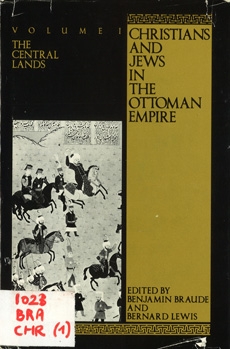| Éditeur : Holmes & Meier Publishers | Date & Lieu : 1982-01-01, New York & London |
| Préface : | Pages : 466 |
| Traduction : | ISBN : 0-8419-0519-3 |
| Langue : Anglais | Format : 145x220 mm |
| Code FIKP : Liv. Ang. Bra. Chr. 1678 | Thème : Religion |
|
Présentation
|
Table des Matières | Introduction | Identité | ||
 Versions
Christians and Jews in the Ottoman Empire | |||||
|
Introduction Benjamin Braude and Bernard Lewis For nearly half a millennium the Ottomans ruled an empire as diverse as any in history. Remarkably, this polyethnic and multireligious society worked. Muslims, Christians, and Jews worshipped and studied side by side, enriching their distinct cultures. The legal traditions and practices of each community, particularly in matters of personal status—that is, death, marriage, and inheritance—were respected and enforced through the empire. Scores of languages and literatures employing a bewildering variety of scripts flourished. Opportunities for advancement and prosperity were open in varying degrees to all the empire's subjects. During their heyday the Ottomans created a society which allowed a great degree of communal autonomy while maintaining a fiscally sound and militarily strong central government. The Ottoman Empire was a classic example of the plural society. An acute observer of similar societies in South Asia defined them with the following description which applies equally well to the Ottoman world: ... probably the first thing that strikes the visitor is the medley of peoples. ... It is in the strictest sense a medley, for they mix. but do not combine. Each group holds by its own religion, its own culture and language, its own ideas and ways. As individuals they meet, but only in the market-place, in buying and selling. There is a plural society, with different sections of the community, living side by side, but separately within the same political unit. Even in the economic sphere there is a division of labor along racial lines.1 For all their shortcomings, plural societies did allow diverse groups of people to live together with a minimum of bloodshed. In comparison with the nationstates which succeeded them, theirs is a remarkable record. In recent years, spurred by an awareness of the ethnic strife that plagues so many nation-states, scholars have turned to the study of ethnicity and ethnically diverse states. Unfortunately, much of this work has been historically and geographically limited. The Islamic world has rarely been included in such studies despite the fact that one of the most enduring polyethnic states was the last great Islamic Empire, that of the Ottomans. In recent studies on the Middle East, the dominant themes have been nationalism on the one hand and modernization on the other, to the neglect of religious and communal issues. The continuing importance of religion and ... | ||||